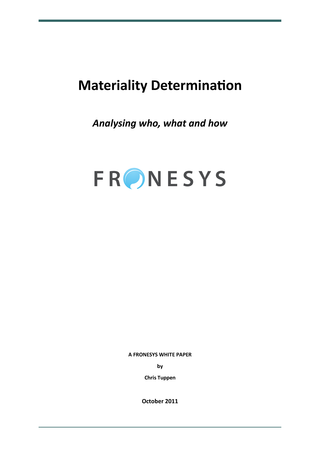INSIGHTS
Materiality Determination: analysing who, what and how

 Traditionally, business strategy has been about issues such as growth, profitability, competitive position and returns to the shareholder. While business leaders need to continue to focus on exactly these issues, what has changed around them is the context in which they operate.
Traditionally, business strategy has been about issues such as growth, profitability, competitive position and returns to the shareholder. While business leaders need to continue to focus on exactly these issues, what has changed around them is the context in which they operate.
We now understand, better than ever before, that human behaviour is driving climate change, short-term thinking has left us with a global recession, and we are faced with unprecedented resource shortages.
As a result, business leaders are learning that focusing on sustainability is essential: companies that manage their economic, social, environmental and ethical performance also maximise their financial performance and long-term value creation. Best practice business strategy is increasingly about transforming global sustainability challenges into business opportunities.
But how does the contemporary business strategist decide which issues to focus on, particularly when sustainability has not been part of mainstream strategic thinking for many?
Joining sustainability to business strategy
For companies that have not started this journey, there is much to do simply establishing the facts regarding sustainability in the firm, getting the conversation going among managers, laying out a grammar and vocabulary for assessing sustainability performance, and building that understanding into their performance measures, systems and processes. For those companies that have passed this first base, few have gone as far as integrating their traditional approach to business with the sustainability imperative.
For all companies, getting the process of materiality assessment is critical because correctly identifying their material issues creates a successful and essential link between strategy and sustainability. And integrating sustainability into the business is a necessary precursor to integrated reporting.
Materiality Determination is a free new white paper from Fronesys summarising the findings of our recent Fronesys research into how a selection of 31 leading companies have assessed their material sustainability impacts. It also evaluates how the processes and metrics they use can be improved.
Next steps
Download the free white paper Materiality Determination, a 6 page summary of Fronesys’s findings on how some leading companies evaluate the materiality of their sustainability impacts.
Want more detail? Fronesys has launched Materiality Futures, a 50+ page report featuring a fuller research analysis and accompanying data sets. Find out more about this report which is exclusive to Fronesys.
MORE FROM INSIGHTS
Assessing the impacts and outcomes of integrated reporting
Fronesys founders played influential roles in the development of the integrated reporting movement, a corporate reporting mechanism that now has around two thousand listed companies as its adopters, and which is now part of the mainstream of corporate reporting. So, perhaps, now is as good a time as any for Jyoti Banerjee to look back and assess the outcomes and impacts, as well as the what-might-have-beens, of this new form of corporate reporting.
Integrated thinking is focus of chapter in new Oxford handbook
Oxford University Press has just released a new chapter from the forthcoming Oxford Handbook of Food, Water and Society: Integrating Multi-Capital Thinking in Business Decisions. The new chapter, contributed by Fronesys partner Jyoti Banerjee, explores how we need to change our understanding of value. Here is Jyoti’s account of what you can expect in this new publication.
A Shift in Perspective – How Universities Create Value
Jyoti Banerjee, partner at Fronesys, highlights that by adopting the principles of integrated thinking and reporting, universities can move away from a focus on reporting short term financial metrics to a multi-stakeholder approach which offers compelling narratives about their value.
SOCIAL FEED
[juicer name=”fronesys” per=’9′ pages=’1′]



